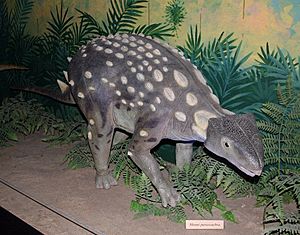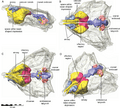Kunbarrasaurus facts for kids
Quick facts for kids KunbarrasaurusTemporal range: Lower Cretaceous
|
|
|---|---|
 |
|
| Model, National Dinosaur Museum | |
| Scientific classification |
|
| Kingdom: | Animalia |
| Phylum: | Chordata |
| Clade: | Dinosauria |
| Order: | †Ornithischia |
| Clade: | †Eurypoda |
| Suborder: | †Ankylosauria |
| Genus: | †Kunbarrasaurus Leahey et al., 2015 |
| Species: |
†K. ieversi
|
| Binomial name | |
| †Kunbarrasaurus ieversi Leahey et al., 2015
|
|
| Script error: The function "autoWithCaption" does not exist. | |
Script error: No such module "Check for conflicting parameters".
Kunbarrasaurus is a type of dinosaur that ate plants. It belonged to a group called ankylosaurs. This dinosaur lived in Australia during the Cretaceous period, which was a very long time ago!
Contents
Meet Kunbarrasaurus
Kunbarrasaurus was a small, armored dinosaur. It walked on all four legs, like a dog or a cow. It also had a long tail. This dinosaur was part of the ankylosaur family, known for their strong body armor.
What Did It Look Like?
Kunbarrasaurus was about the size of a large pig, growing to about 3 meters (10 feet) long. Its body was covered in bony plates, like a natural suit of armor. These plates helped protect it from predators. It also had a small head and a beak-like mouth, perfect for munching on plants.
Where Did It Live?
This dinosaur lived in what is now Australia. During the Cretaceous period, Australia was part of a supercontinent called Gondwana. The area where Kunbarrasaurus lived was likely a lush environment with plenty of plants for it to eat.
A Special Discovery
The first fossil of Kunbarrasaurus was found in Queensland, Australia, in 1989. It was a very complete skeleton, which is rare for dinosaurs! This amazing find helped scientists learn a lot about this unique armored dinosaur. For a while, it was thought to be a type of Minmi paravertebra, another Australian ankylosaur. But later, scientists realized it was different enough to be its own genus, and they named it Kunbarrasaurus. The name Kunbarrasaurus comes from the Gugu Yalanji language, where "Kunbarra" means "shield." This is a great name for an armored dinosaur!
Images for kids
-
Australian thyreophoran localities: 8 denotes where the holotype was found
-
Model based on the specimen that later became the basis of Kunbarrasaurus, then labelled as Minmi paravertebra, National Dinosaur Museum
-
CT scan of the skull, showing internal components
See also
 In Spanish: Kunbarrasaurus ieversi para niños
In Spanish: Kunbarrasaurus ieversi para niños
 | Mary Eliza Mahoney |
 | Susie King Taylor |
 | Ida Gray |
 | Eliza Ann Grier |




